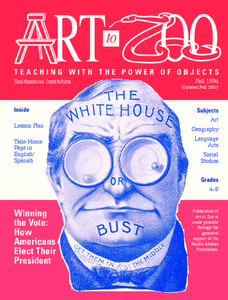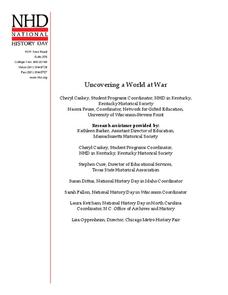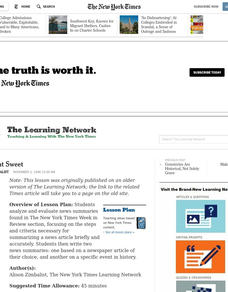Curated OER
Lincoln-Douglas Debates of 1858
Young scholars examine the transcripts of the 1858 Lincoln-Douglas debates and create a platform for each candidate in the 1858 Senate race. They utilize the candidates' arguments to explore the historical and political impact.
Curated OER
Passport to the Eastern Hemisphere
Seventh graders create a time line of significant dates in the history of their nation. This requires students to examine the entire history of a country and make informed judgments based on their historical knowledge.
Curated OER
Meteorology
Seventh graders examine the job of meteorologists. They decide which characteristics of the atmosphere that meteorologists focus on. They use local weather maps from newspapers to predict weather in their area.
Curated OER
The White House or Bust: How Americans Elect Their President
Students explain the presidential duties and who is eligible to run for president. In this The White House or Bust article, students complete a map of the electoral college. In addition students analyze historical campaign posters....
Curated OER
Ellis Island Online
Students research their ancestors by visiting a number of online resources. They read personal immigration stories and begin creating their own family tree.
Curated OER
Technology: The State of the Internet
Young scholars develop ratings criteria for evaluating Websites. Once they brainstorm lists of qualities for Websites, students, in pairs, browse various Maine Websites and create evaluation systems. As a follow-up activity, young...
Curated OER
The Kennedy Administration and the Civil Rights Movement
Students evaluate the Kennedy Administration's involvement in the civil rights movement. In this Civil rights instructional activity, students read and take notes from speeches connected to the historic March on Washington from the...
Curated OER
What Is War?
What kinds of human activity do we define as "warlike"? Middle and high schoolers examine various definitions of war and types of warfare, especially as these descriptions relate to the kinds of war we are witnessing at the beginning of...
National Endowment for the Humanities
Chronicling America: Uncovering a World at War
As part of a study of World War I, class members read newspaper articles from the time that urge American involvement, non-involvement, or neutrality. Using the provided worksheet, groups analyze the articles noting the central argument...
Curated OER
Fort Life in the Green Bay Area, 1816-1841
Ninth graders examine from the perspectives of military personnel, Native Americans, families of soldiers, and civilians who lived and worked in the region during the era. They create a 2-page scrapbook layout from at least two of the...
Curated OER
Cold War Era Film Censorship: High Noon- a Slice of Americana Or Communist
Students study of the effects of the Cold War on the home front. They analyze the film High Noon according to an abbreviated version of the standards that films were judged by in the early 1950s and determine whether or not High Noon is...
Curated OER
Navajo Code Talkers
An engaging lesson focuses on the contributions of the Navajo people during World War II. Learners read the book Navajo Code Talkers by Andrew Santella, answer a series of comprehension questions about the text, and write a letter as a...
National History Day
Uncovering a World at War
Has media always had an influence on public policy? After researching and reading news articles written during World War I, learners understand the influence of communication and media. They discuss articles in small groups and as a...
Curated OER
Stars and Stripes Forever: Flag Facts for Flag Day
Students are introduced to the symbolism of the flag of the United States of American. They identify flag components, history, etiquette and lore. They also use constrution paper to make a flag and discuss the Pledge of Allegiance.
University of Arkansas
Our Responsibilities
The fourth in a five-lesson plan unit examining human rights and personal responsibility asks class groups to investigate a current rights issue, and using the provided graphic organizer, summarize the issue, consider which rights are...
Curated OER
Tintin and I: Primary and Secondary Sources
Mickey Mouse, Elmo, and Tintin? Belgian cartoonist Georges (Herge) Remi’s famous comic character launches a study of primary and secondary source material and the impact these sources have on storytelling. Class members also examine the...
Curated OER
Finding Promise in Compromise
Examine how the 'safe passage' for Palestinians between the Gaza Strip and the West Bank affects those living in Israel and reflects both conflict and cooperation between the Israelis and Palestinians. The class compares the perspective...
Curated OER
Short But Sweet
After analyzing and evaluating news summaries found in the New York Times "Week in Review" section, middle schoolers study the steps for summarizing a news article briefly and accurately. They write two news summaries: one on a newspaper...
Curated OER
New York City Delights: The Taxi Cab
You set the rate! Step into the shoes of a taxi driver in New York City, and also pretend to be a person who uses taxis to get around town. The class will conduct collaborative research to learn about the history of taxis. Then, they...
Historical Thinking Matters
Spanish-American War: 1 Day Lesson
After analyzing newspaper articles portraying different perspectives of the explosion of the Battleship USS Maine, your young historians will take a stand on which position is the most believable in both discussion and writing.
Smithsonian Institution
Mobilizing Children
Scholars find out how the government used propaganda to mobilize children to help in the war effort. Lesson exercises include analyzing a quote from Franklin Roosevelt, viewing propaganda images and posters, and participating in a lively...
Curated OER
Jazz in America Lesson Plan 7
The student will explore free jazz, fusion, and contemporary jazz. They will listen to avant garde, fusion, and pop recordings. In addition, they participate in a class discussion regarding jazz's contribution to and reflection of...
Mississippi Department of Archives and History
Protesting Violence without Violence
The ultimate legacy of Emmett Till's violent death is its role in the non-violent roots of the Civil Rights Movement. A instructional activity compares contemporaneous articles with the lyrics of Bob Dylan's "The Death of Emmett Till"...
Curated OER
Jazz in America Lesson Plan 5
Students survey Bebop and identify the basic terms associated with jazz.They experience the music of Charlie Parker and Billie Holiday and participate in a class discussion regarding jazz's contribution to and reflection of American...

























